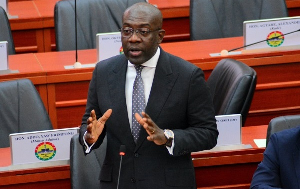The Ghana Statistical Service (GSS) on Wednesday launched its Five-year Corporate Plan, which outlines an ambitious journey for the Service with a concentrated and revitalised effort.
The Plan sets the stage for the GSS to meet Ghana’s needs and drive evidence-based decision-making and planning using responsive and timely analysis that shines light on disparities of those left behind, and celebrate the successes that modern Ghana continues to enjoy.
Professor Samuel K. Annim, the Government Statistician, at the launch in Accra, said to achieve the target, the GSS had five strategic goals, which included the building of a responsive, capable and motivated human resource based on a revised institutional structure.
He mentioned the other goals as mobilising financial resources and control cost to bridge funding gaps; ensuring full integration of information communication and technology (ICT) solutions in the operations of GSS; creating an inter-operable, capacitated and resourceful National Statistical System (NSS); and improving the production and use of official statistics for national development and planning.
Prof. Annim said the demand for data worldwide was now greater, “whether it is to hold those in power to account, or to inform national development policy and planning that will help those most in need. Data is an essential part of democracy and the basis for decision making.”
He said within Ghana, the economy was rapidly changing, and expectations continued to grow from data users and other stakeholders who depended on the GSS for timely, accurate and trusted information for planning and evidence-based decision making.
Prof. Annim said the GSS’s new Corporate Plan sets out how it would lead the efficient collection, production, management and dissemination of quality Official Statistics to provide the country with the needed data for the achievement of the tenets of “The Coordinated Programme of Economic and Social Development Policies, 2017-2024.”
This would facilitate the ‘Beyond Aid’ agenda, and track Ghana’s performance of international development indicators notably the African Union Agenda 2063 and the Sustainable Development Goals.
Again, to support national development, the Plan outlines how the GSS would continue to use cutting edge approaches to statistical production and analysis, ensuring that all its outputs are produced to international standards and compiled by competent and motivated staff.
“This is a huge aspiration for Ghana too, and the GSS’ Plan is a call to action for other statistical producers and users of Ghana’s data for timelier, more granular and relevant statistical information that better informs and tracks national progress towards development agendas,” Prof. Annim said.
In addition to supporting this Plan, the Government had shown its commitment and vision for data with the introduction of the new Statistical Service Act (Act 1003), which was passed in 2019.
Prof. Annim said the Act serves as a key mechanism for harnessing the changes in the approaches used by the GSS to collect and produce statistical information at the national level.
This includes new ways and use of non-traditional statistical information and data such as big data, satellite imagery, administrative data, and commercial data.
Consequently, GSS is looking forward to a renewed focus on engagement with all sectors to ensure that data continues to be used for evidence-based decision making.
The Plan, Prof. Annim said, also recognised the role Ghana must play at the continental and global levels and highlighted the importance of good statistical information in today’s changing world.
Dr Grace Bediako, the Board Chairperson, Ghana Statistical Service, said the new GSS Act 1003, 2019 gave clear autonomy to the Service with a Board of Directors who report directly to the Office of the President, compared to what pertained previously.
She said data and information provided the trust, transparency and integrity that society must demand for evidence-based decision making.
Dr Bediako called for enhanced investment by the Government for the true measurement of national development and things that mattered to citizens.
This would ensure that the policy and international development interventions in Ghana were reaching the right people, in the right places, so that no-one was left behind, she said.
Mr Carsten Zangenberg, the Director of Administration, Statistics Denmark, recounted his country’s journey towards the development of sound data and statistical information to drive government policies for efficient public administration and better resources for citizens.
He said Statistics Denmark was working with the GSS to improve the collection and use of Administrative data.
Business News of Thursday, 23 January 2020
Source: ghananewsagency.org













